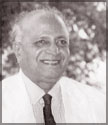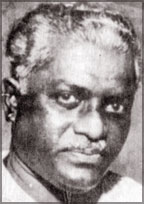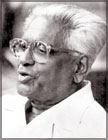Lanka Sama Samaja Party and the working class
Percy WICKREMESEKERE
The Lanka Sama Samaja Party celebrates its 72nd anniversary this
month and it is the oldest political party in Sri Lanka today. Although
it was formed on the 19th December 1935 its activists were involved in
the anti imperialist struggles such as the Suriya Mal movement from the
early thirties.
At the foundation of the Party in 1935 the party had two clear
objectives. To gain complete independence from the foreign imperialists
who were ruling Ceylon as the country was then known and to transform
the Capitalist Society to one of a socialist nature.
|

Dr. N. M. Perera |
However it must be said that at the founding of the party in 1935 it
was not considered a Marxist Party. It was towards the late thirties
that the Party came to embrace Marxism as its guiding philosophy and
with the developments in the International Communist Movement came to
become a Trotskist party as opposed to the ordinary Communist Parties
that were paying pooja to Joseph Stalin who was then the leader of the
Soviet Union.
This was a time when Leon Trotsky the co Leader of the Russian
Revolution along with Lenin was ousted not only from the Communist Party
of the Soviet Union but also driven out of the country.
The International Communist Movement at the time was very live to the
developments in the Soviet Union where Stalin organized the so called
trials of so many Bolshevik Party Leaders who in fact played a leading
role with V. I. Lenin in the Russian revolution of 1917.
|

Philip Gunewardene |
The Lanka Sama Samaja Party was one of the few if not the only Party
in the world at that time to embrace the positions of the left
opposition led by Leon Trotsky opposed to the dictatorial policies of
Stalin.
Thus it was those members of the Sama Samaja Party who supported the
policies of Stalin who were expelled from the Party in 1938/39 and
thereafter the Party aligned itself with the 4th International formed by
Trostky a little prior to his assassination by a Stalinist agent in
August 1940.
The Lanka Sama Samaja Party, though its leaders were from the upper
Middle Class intelligentsia was from its very inception a workers party
or a party of the working class. Its aim of ushering in a Socialist
Society in this country had to be under the leadership of the working
class supported by the poor peasantry.
The Lanka Sama Samaja Party leaders like Dr. Colvin R. de Silva began
to organize workers in Trade Unions around 1933 even before the
formation of the Party.
|

Dr. Colvin R. de Silva |
The workers at the Wellawatte Spinning and Weaving mills - now no
more, but at that time and even till the fifties was a large workplace
who were organized in A. E. Goonesinghe’s Labour Union had got
disillusioned with his narrow leadership and looking for some healthier
leadership had come to H. Sri Nissanka Q. C. and it was he who sent the
workers to Dr. Colvin R. de Silva who took them under his wing and
formed a union.
The Lanka Sama Samaja Party in its early years had to face stiff
opposition from the Labour Unions of Mr. A. E. Goonesinghe who was then
the supremo of the Trade Unions in Colombo. He knew the value of leaders
of the L.S.S.P like Dr. N. M. Perera, Philip Gunewardene and Dr. Colvin
R. de Silva and he set up his goons to break up meetings organized by
the young L. S. S. P leaders.
It may be stated that not only goon squads but even narrow anti
Indian Communal Slogans were employed by Goonesinghe against the
L.S.S.P.
However none of these tactics could defeat the youthful and
enthusiastic leaders of the L.S.S.P and by 1947 A. E. Goonesinghe joined
Mr. D. S. Senanayake’s U.N.P. govt as a Minister.
In the 1930s it was in the Plantation Sector that the L.S.S.P led the
workers in their struggles. The Hewawessa and Muloya struggles that
resulted in the killing of heroic workers such as Govindan remain as an
inspiration even today.
It was because the L. S. S. P. leaders were organizing the Estate
Workers who were being exploited by the British Companies and their
planters that pressure was brought on the Colonial Government to ban the
L.S.S.P and it was after the L.S.S.P. was banned and sent underground
that the estate workers came to be organized by a Communal Leadership
which persists to this day.
Unlike today the harbour workers were a very vital sector of the city
working class. The L.S.S.P. organised the port workers who at that time
and till a little after 1956 did not have an 8 hours working day, into
strong unions.
They were most militant and were truly fighters for their cause. It
was the same with the workers who were employed by private bus
companies. They were a most exploited lot and came to be organized in
the United Motor Workers Union led by L. S. S. P. activists.
Prior to nationalisation of these bus companies the Motor Workers had
to carry on a struggle not only to win their economic demands but also
to campaign for the nationalisation of the Private Transport Companies
which culminated in the setting up of the Ceylon Transport Board in
1957.
The Petroleum Distribution which was in the hands of three foreign
Oil companies - Shell, Caltex and Standard Vacuum - had its workers
organized by the L.S.S.P led Oil Workers Union.
It was the same with the hotel and food industry workers who came to
be organized under the leadership of comrade D. G. William in the Hotel
Workers Union. All these unions came under the leadership of the Ceylon
Federation of Labour.
Thus the Lanka Sama Samaja Party could be said to have played a
pioneering role in organizing the working class of this country not only
to win their economic demands in their Trade Unions but also to organize
them politically for struggles beyond petty economic issues.
That is how one remembers today the great Hartal of August 1953 where
9 workers sacrificed their lives in a political struggle against the
increasing of the prices of rice and other essentials by a U.N.P. govt
that promised at the elections that a measure of rice will remain at the
price of twenty five cents as long as the UNP was in power.
The Lanka Sama Samaja Party has been in the forefront to safeguard
the rights of minorities.
In 1947/1948 when the first government of the United National Party
brought in legislation regarding the granting of citizenship and
defranchised a large section of the plantation workers in the up country
areas, it was the members of Parliament belonging to the L.S.S.P that
carried on a campaign on behalf of the workers of Indian origin.
Once again in 1956 when there was a movement to make Sinhala the only
official/state language of our country it was the L.S.S.P that stood
firm for a policy of parity of status for both Sinhala and Tamil
Languages as state languages of the country.
The statement of Dr. Colvin R. de Silva in the language bill debate
that one language will lead to two countries and two languages will
preserved Ceylon as one country is today even quoted by people who were
supporters of the policy of Sinhala only at that time.
That consequences of that move to make Sinhala the only official
language in the country has now developed into the present war in the
North/Eastern provinces of our country.
The policies of the Lanka Sama Samaja Party have always been
determined on the basis of what is fair and just to all sections of the
people of our country.
The Party has not considered what is popular for the time being and
decided on such policies in an opportunistic manner. It is for that
reason that since independence the Lanka Sama Samaja Party has had to
face various odds in fighting various communal and other narrow
organisations in the country.
The policy of the L.S.S.P has been to select a policy that is fair
and just to all the communities in the country however much it may be
unpopular for the time being. Even today the party still suffers from
the effects of such policies.
But the party is happy to state that it has never in its history of
seventy two years taken any opportunistic line on any matter for the
sake of its glory at the risk of damage to the country.
The Lanka Sama Samaja Party can also proudly claim that through out
its existence for the last Seventy Two years it has a record of not
having had any member being even accused of any corruption in Public
Life. This is a record that not many Parties in the world can claim. |

